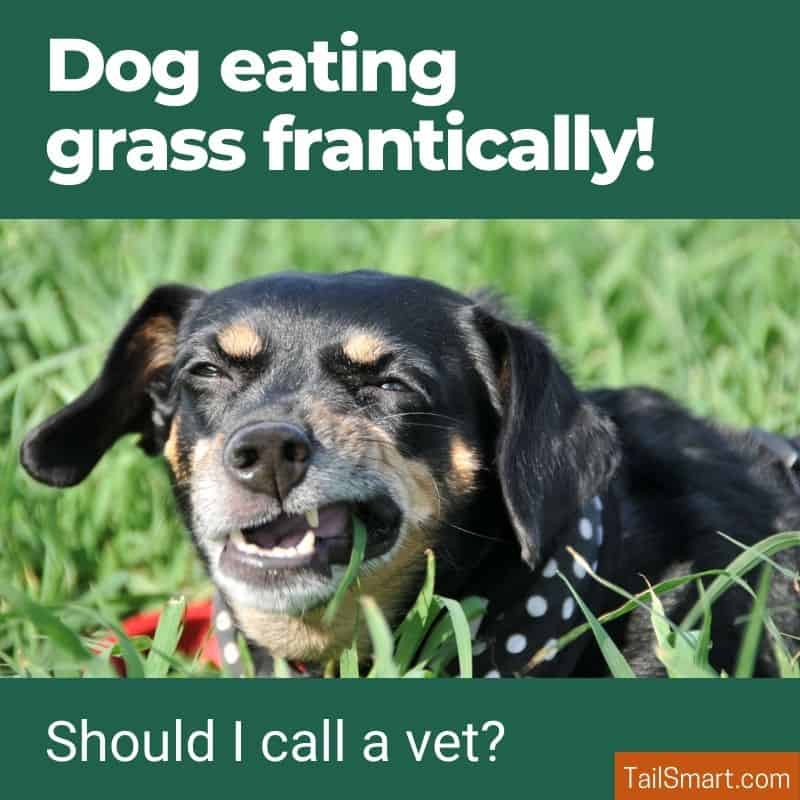
Dogs are curious creatures that will sniff, lick, and chew pretty much anything they see. It’s just how they experience the world. Sometimes they’ll “graze”, burrow, or nuzzle their noses in grass simply because they found something interesting hidden in it or have picked up a trace scent.
But there will be moments when it’s more than a passing curiosity: your dog eating grass frantically, like a starved cow. You may even find your dog frantically licking the grass. Is this something normal, or possibly dangerous? Is it something that warrants a visit to the vet?
Why do dogs eat grass?
Dogs may instinctively eat grass if they have indigestion or an upset stomach. They know this isn’t something they can digest, and will probably throw it up or poop it out. If they’ve eaten something that doesn’t agree with them, they will look for something that will help flush it out of their system.
If your dog only eats grass occasionally and seems to be otherwise fine, then consider this odd behavior as his way of relieving himself of mild discomfort. It’s like those days when you sometimes have a heavy stomach or feel bloated and you seek out something that you think or know will comfort you.
Sometimes, grass-eating can also indicate boredom or excess energy. That usually occurs among puppies or active or curious breeds that may not be getting enough exercise or stimulation. Your best bet in this situation is to figure out a way to expend some of that energy. Try taking them out for a longer walk than normal or give them toys that they can play with. See if the change in routine curbs their habit of eating grass.
Can dogs safely eat grass?
Grass isn’t really part of a dog’s natural diet, but some dogs may like the taste or texture. It’s the same way that some dogs like to eat crunchy lettuce or enjoy a banana. Just make sure that any grass they eat does not contain chemical pesticides or fertilizers that can make them sick. You should also keep them away from any mowed grass clippings as these have a tendency to cause stomach irritation.
Also be sure that the area is free of any plants that are poisonous to pets, such as dumbcane, oleander, and the sago palm plant. These can cause their air passage to swell, or contain chemicals that can damage the dog’s heart and liver.
While most plants used in home landscaping are relatively safe, you have to be wary of wild grasses they may find in fields or outdoor areas. And during the holidays, make sure your dog can’t access poinsettias and mistletoe, both of which are toxic to pets.
While the plants themselves aren’t poisonous, they can contain parasites like tapeworms and hookworms. If your dog is prone to digestion problems and has a history of getting these diseases, you may want to prevent him from eating grass and other plants.
Is eating grass dangerous? Should I call a vet?
If your dog only occasionally eats grass and seems to do it in a leisurely or playful manner, then you can just let it slide as your pet’s personal quirk.
But it’s a different matter if:
- the dog eats a large amount of grass each day
- the dog eats grass frantically
- the dog appears desperate to eat grass
- the dog is frantically licking the grass
- the dog looks like they’re in pain, discomfort, or acts lethargic
These are all signs that your dog may have either a physical or a behavioral problem. They may have severe stomach pain or discomfort that they’re unable to express and they’re unsuccessfully trying to relieve on their own. They may be disoriented or be under stress. In this case, the habit of eating grass may not be dangerous for them but it may be a sign that your dog needs help.
If this is the case your best option is to bring them to a vet for a full examination. Why take a chance?